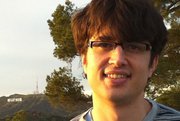EECS Department Colloquium Series
Engineering Intelligent Molecular Systems
 |
Wednesday, February 19, 2014 David Soloveichik |
ABSTRACT:
Building molecular systems where computing and decision making are carried out by the chemical processes themselves will have revolutionary consequences in industrial and health applications. For example, cells engineered to produce biofuels will have embedded control modules continuously optimizing their yield. "Smart drugs" will target cancer cells based on complex functions of relevant indicators without affecting healthy tissue. To achieve this vision, we'll need both: (I) composable molecular parts, and (II) a principled understanding of how to combine these parts into smart molecular systems. I will talk about my efforts on both fronts: First, I have been developing the technology of "DNA strand displacement cascades" that provides programmable molecular parts for functional networks. To address the second challenge and systematically create complex behavior, I am drawing on formal models of computation to achieve systematic and scalable design, rigorous analysis and verification. A new notion of a "chemical algorithm" is emerging that fuses algorithmic ideas from computer science and the basic laws of chemistry and thermodynamics, to enable the rational design of smart molecular systems.
BIOGRAPHY:
David received AB and MS degrees (2002) in Computer Science from Harvard, and a PhD degree (2008) in Computation and Neural Systems from Caltech, where his advisor was Erik Winfree. His dissertation on "Self-assembly, Molecular automata, and Chemical Reaction Networks" was awarded the Milton and Francis Clauser Doctoral Prize for the best doctoral thesis at Caltech (2008). He was a Computing Innovation Fellow at the University of Washington, Computer Science & Engineering, and he is currently a Fellow at the UCSF Center for Systems and Synthetic Biology.
His early work in self-assembly showed the surprising power of simple crystallization-like processes to construct algorithmically complex objects. Later, he helped invent the technology of DNA strand displacement cascades for building de novo molecular networks. He co-authored the first experimental demonstration of molecular logic circuits with strand displacement, and developed a theory for implementing complex analog behaviors. He received the Feynman Prize in Nanotechnology (Theory) from the Foresight Institute (2012) for this work.
David is interested in all aspects of "molecular programming": the rational design and implementation of complex molecular systems for synthetic biology, nanotechnology, and bioengineering.
| Return to EECS Joint Colloquium |


